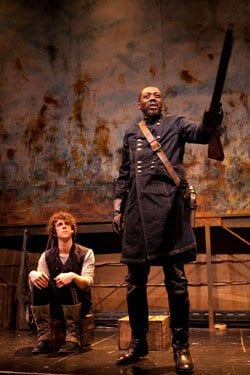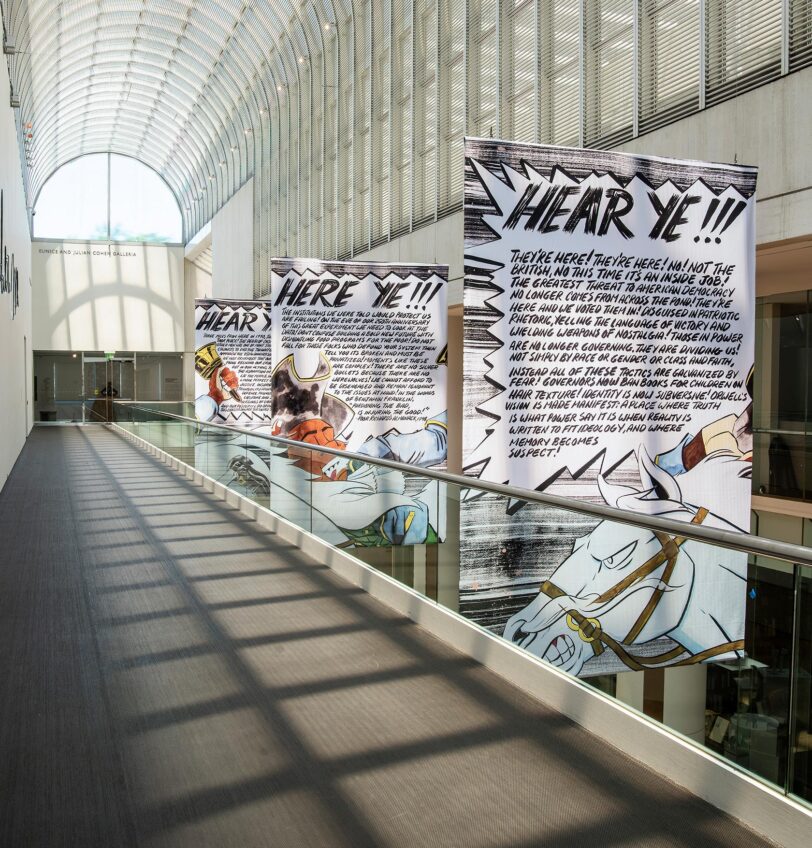
Charles Babbage conceived the prototype of the first computer in the 1830’s and called it an “analytical engine.”
The British polymath envisioned such artificial intelligence executing instructions and storing memory. Ada Lovelace, the mathematically gifted daughter of the poet Lord Byron, soon created what many experts consider to be the first program for Babbage’s conception.
Now the Brooklyn-based, Indie folk-rock band known as The Lisps have imagined a mid-19th century steam-powered, peace-making machine in a show called “Futurity: A Musical by the Lisps” – in its world premiere presentation by American Repertory Theatre at Club Oberon (through April 15).
The futurists conceiving this “peace machine” are Lovelace and a fictional Union soldier and novice inventor named Julian Munro. No matter that Lovelace died in 1852, for Lisp co-founder Cesar Alvarez and co-writer Molly Rice have put together a science fiction-like book that means to combine science and potential romance and transcend time.
Hypothetically the show’s indie folk rock score — with lyrics by Alvarez and music by Alvarez and the Lisps — ought to work well with such a utopian merging of human aspiration and technology. After all, many practitioners of folk music and rock — Bob Dylan and Bruce Springsteen, for example — have passionately written and sung against the pursuit of war and for improving the lot of humanity. At the same time, “Futurity” brings welcome attention to the unsung pioneering efforts of a woman in the sciences when men seemed to have a monopoly in those fields.
Adding to the potential are the clear enthusiasm of not only The Lisps but also a talented group of actors under the smooth direction of Sarah Benson. Whether climbing to the upper level of David Israel Reynoso’s multi-zoned set or fulfilling the kicking and marching routines of Annie Parson’s physically demanding choreography, the cast seems inexhaustible.
Some theatergoers may find repositioning in their chairs as challenging as they keep up with the actors’ journey around Oberon — especially the Union soldiers, played with great spirit by a strong ensemble of black and white actors.
The soldiers’ leader, known simply as The General, fires up his subordinates with purpose and full conviction as they carry out his orders to stymie the efforts of the Confederacy in Virginia. Edwin Lee Gibson, a veteran black actor in his American Repertory Theatre debut, plays The General, arguably patterned on Ulysses S. Grant, with arresting charisma and drive.
With all of these elements going for it, how did “Futurity” become an earnest and ambitious disappointment rather than a fully realized and exciting original?
Quite frankly, the problem lies with a book that often seems more of a learned discourse than an absorbing mixture of romance and invention. What does it say that moments of conflict between Lady Byron and daughter Ada — a compelling Anne Gottlieb and a winning Sammy Tunis respectively — have more impact than much of the imagined correspondence between Lovelace and Munro?
Since Munro — played with appealing humanity by Alvarez — is a fictional character and the show purposely futuristic, Rice and Alvarez ought to be taking more risks about iconoclast Julian and visionary Lovelace’s romance by letters.
They could take lessons from the fully realized romantic musical “Daddy Long Legs,” which proved a dreamy recent triumph at Lowell’s Merrimack Repertory Theatre. Compounding their difficulties is a song cycle often at odds with itself. For much of the 90-minute, no intermission show, Alvarez’ thoughtful, often poetic lyrics about war and technology –especially on the “The Machine That Creates Peace” and the final “Epilogue: Singularity” — need more varied and catchy musical accompaniment to enrich and sustain them.
Ultimately, Julian’s soaring vision about “a machine that ends war” deserves a much more tuneful hearing. “Futurity” provides welcome attention to the achievement of Ada Lovelace and the underrated impact of math and science. Julian compares the steam machine to music.
Audiences have a bounty of thought to consider here; they simply need more heartfelt music and plotting.






